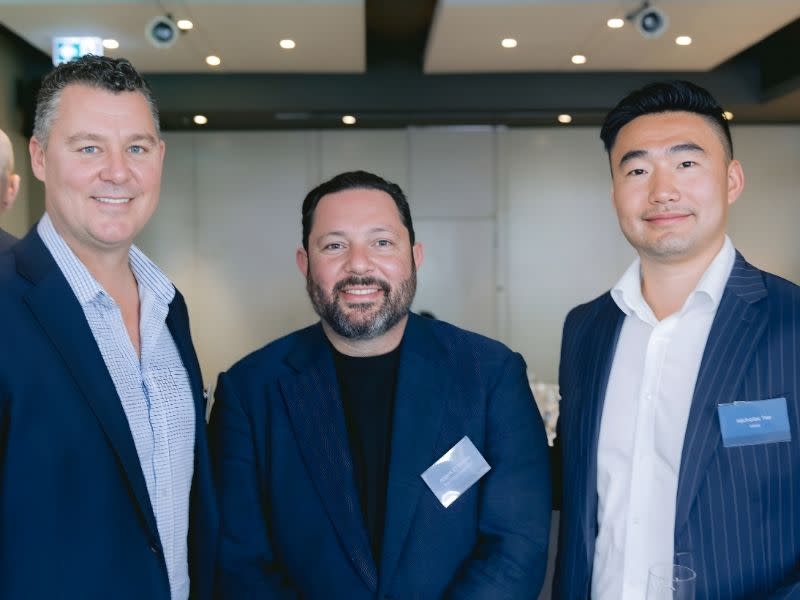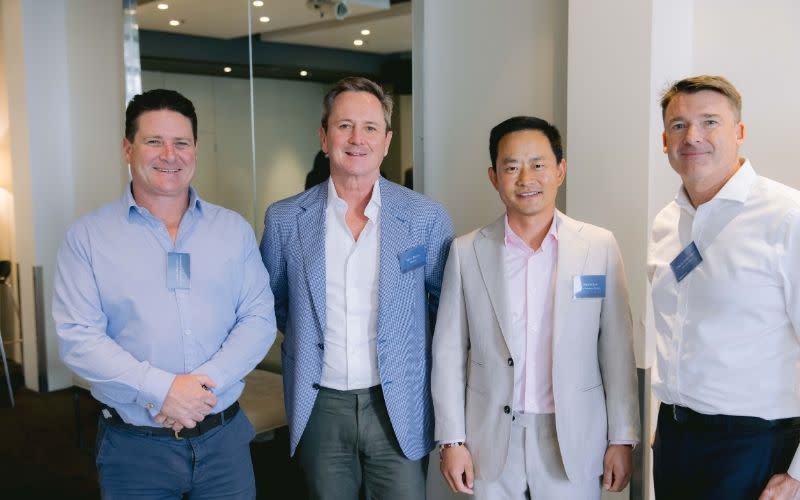Tight Credit, Tougher Sales Test Developers Nationwide

Non-bank lenders are tightening scrutiny on borrowers even as offshore investors continue to pour money into Australian property debt.
At a Sydney roundtable hosted by alternative asset manager Centuria Bass, developers and financiers said strong global appetite for real estate credit was being met with more cautious lending.
The discussion—part of The Urban Developer’s industry roundtable series—brought together active NSW developers and Centuria Bass executives to unpack capital flows, underwriting and feasibility in the current cycle.
Centuria Bass chief executive David Giffin said liquidity remained strong and Australia continued to attract investment.
“There will continue to be capital flows out of the US … Australia benefits from that,” he said. “We’ve got a great rule of law… it’s a very safe place.”
He said Centuria Bass was backed largely by professional and high-net-worth investors with a long-term view of the credit cycle.
“It’s predominantly funds provided from wholesale investors,” he said. “In all markets there will be performance volatility but our position in the capital structure protects our investors from movement in underlying asset values providing stability of returns.
“More broadly, performance of the asset class over recent history has been outstanding.”

Centuria Bass managing director of origination David Stone said lenders were “doing significantly more due diligence”, reassessing valuations and delivery risk with greater caution—often going back to “get another valuer and make sure it’s right”.
He said non-banks were filling the gap left by major lenders, which had stepped back from complex projects.
“The cost-out model doesn’t support intensive underwriting,” he said. “We will do a lot more work on a loan than they will ever do.”
Regulators are also sharpening focus on private credit.
In a recent report, ASIC warned fund managers to improve disclosure and governance or face tougher oversight.
Giffin said new measures foreshadowed by the regulator were targeting greater transparency on asset performance and fee structures—which would not restrict the flow of funds into the sector.
Strong risk adjusted returns remained available to investors and would drive continued investment.
“ASIC’s investigation is clearly focused on disclosure and the need to provide investors with clarity on performance of underlying assets and management fee structures,” Giffin said.
“We welcome the regulatory review and are supportive of investors being provided with clarity to support their decision making in selecting a manager.”
He contrasted domestic lenders with global credit managers, where investors often have little visibility.
“I’d be more concerned as an investor in a global credit fund where you have very little visibility to what assets are held and what leverage within the funds,” he said.
He said investors entrusted Centuria Bass with their savings because they have confidence in how its funds are managed.

From the developer side, Justin Brown, founder and chairman of Abadeen—specialising in premium apartments and mixed-use communities—said the bottlenecks of planning and now construction were shifting in the development cycle, with sales now proving the toughest hurdle as potential pipeline emerges.
“Planning seems to have broken its back, construction you can seem to manage again,” he said. “And now it really comes down to the sales. I think sales and sales velocity is harder than most people think they are.”
He said Sydney’s price signals were starting to shift.
“You’ve just seen the North Shore with the top end of houses being $30 million, $40 million then earlier this week one sale for $50 (million). It sold in three days,” he said.
“Premium housing is rising, this will recreate the percentage difference between the houses and the apartments … I think we’re heading into that space, that will then improve apartment sales.”
Brown also noted a change in who’s driving demand.
“Investors in our opinion left in 2017 … the traditional negative-gearing family investment has been taken up by the ‘bank of mum and dad’,” he said.
“I wonder whether that sucked out a lot of pent-up demand of investors we normally see at this part of the cycle.”

Mark Elias, co-chief executive of Urban Property Group—an integrated builder-developer with build-to-sell and build-to-rent platforms across NSW—said project performance now varied sharply by region.
“Areas such as Little Bay, Gosford, Penrith and Edmondson Park are selling at a higher pace given the lack of new quality development in those localities,” he said.
He said delivery now depended more on capability, track record and balance-sheet strength rather than planning approvals.
“There are no shortage of well-serviced and located housing sites in NSW,” he said.
“How many developers are getting approvals for large scale projects [but] they can’t commence?
“This new wave of state significant development approvals won’t be feasible unless the developer is reputable with strong track record, well-financed and have capacity to keep or retain some stock.”
Centuria Bass managing director and co-head of origination Charlie Robertson said builder depth remained thin at the smaller end of the market.
“A lot of builders have left the industry in the last five years,” he said. “Cash flow got constrained during Covid. These guys were all in their 60s, 70s and decided to fold. There’s now a new generation of builders [so] finding people with track records, is a challenge.”
Wayne Sun, founder of Sun Property Group (SPG)—a boutique residential developer active across NSW and Victoria—said the apartment market still trailed house prices, creating demand for well-designed medium-density projects.
“The apartment has a long way to catching up with the houses,” he said. “When everywhere is highrise and you can’t afford a house then the lowrise, beautiful garden design, and the medium density is the only choice you can afford.”
Luke Hartman, chief executive of Metro Property Development—active across greenfield, townhouse and housebuilding projects in multiple states—said conditions varied sharply between markets.
“I’ve never seen Adelaide stronger,” he said. “I’ve never seen more people wanting development in Adelaide. Twenty years ago people would say, ‘Why do you bother with Adelaide?’ Now it’s the flavour of the month”.
He said affordability once drove demand but has now disappeared, with prices in Adelaide’s house-and-land market catching up to Melbourne.
“There’s no price break,” he said. “In house and land world, it’s now equivalent prices to the greenfield locations in Melbourne.”
The shift, Hartman said, had been driven in part by Melbourne’s downturn.
“It’s due to how bad the Melbourne market is,” he said. “Townhouses … has been a really, really challenging market. Sales is the biggest challenge … if you’re in the $1.5 to $2.5 million range, finding buyers is really, really challenging. Sub $1 million … can really move.”

He said Sydney’s greenfield market remained solid but constrained by rising construction costs.
“Sydney in the greenfield space is strong … the majority of our product is sub $1.5 million,” he said.
“If you’re asking a third party to package houses in Sydney, builders will put fat on fat, and if there’s too much fat these things just don’t get out of the ground.”
Stone said capital would remain available for developers with strong records, even as lenders applied stricter criteria.
“I don’t think there’s much of a rate-cutting cycle left here,” he said. “There’s going to be no shortage of capital for developers who want to [borrow], but we are going to be more selective.”
As Sun summed up: “The property game is about trend. You catch the right cycle, you do very well.”
The Urban Developer is proud to partner with Centuria Bass to deliver this article to you. In doing so, we can continue to publish our daily news, information, insights and opinion to you, our valued readers.














